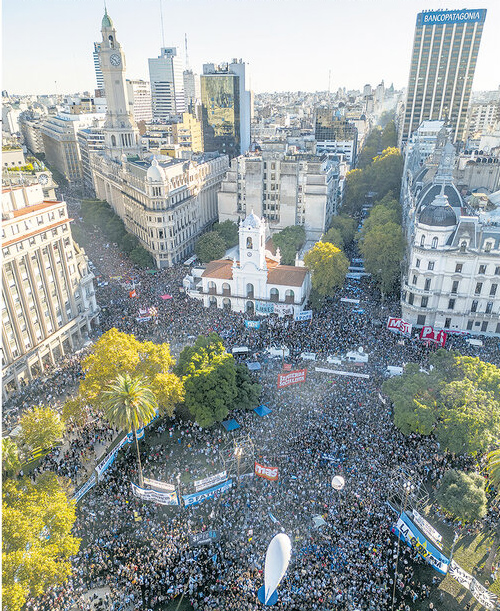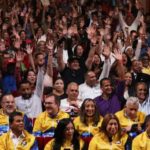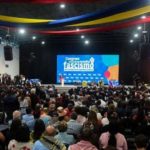The occasion was historic for the gigantic participation (800,000 people in the capital and around 1 million throughout the country) and its broad social character. The cross-section united from the students, to the professors and the deans with workers and the unemployed; from the young and the elderly, to entire families of modest, middle and upper class; from the activists and the trade unions to the ordinary folks of the neighbourhoods.
Buenos Aires, 23 April 2024, Defend Education March, 800,000
Beyond the usual banners of party activists and social movements, the youth participated actively with handwritten slogans. Here are some, out of many: “A cultured people cannot be enslaved”, “Public and Free University”, “Pencils will never stop writing”, “Why so afraid to educate our people? », “No public education, no future”, “We are no commodity for sale”, “In the streets, we don’t miss the classes”, “Free Public and Higher Education”, “Education is not something sold”, “Our ignorance you want, not our freedom”, “More money for education, not for repression”, “Rebel and Start Learning” , “I am to be the first doctor in the family”.
Besides this, the demonstrators held aloft books on culture, literature, sociology, politics, science, by well-known authors, Rodolfo Walsh, Eduardo Galeano, Marx and Engels, Orwell, Freud, Perón, Cristina Kirchner – themes ranging from Children to the Malvinas’ War. In short, an event with a broad visual profile, and content to match, in defence of culture and education. A message left (long ago) by Cuban José Marti[1]floated in the air and in the emotions: “Only a cultured people can be truly free. » [..]
The serried ranks of demonstrators formed a compressed torrent – numerically comparable to that of the 2022 World Cup – in defence of the National Free Public & Higher Education, itself a cultural legacy of Juan Perón (1945) expanded in the Kirchner era (from 2003). The demonstration denounced the harm inflicted by the State-budget cuts to the functioning of public Universities – the exorbitant prices in electricity, teaching materials, teachers’ salaries impossible to pay. But who repays the IMF debt contracted during the Macri era? Who is to finance Milei’s “zero budget deficit”? Not the wealthy caste, but the workers via more taxation and cuts in public services, education, health, transport. There is no magic financing. It digs deep into the pockets of most of people, as well as the traders, small and medium-sized national industries, public works and construction companies forced to close and lay off workers.
This 23 April resounded with the cry: Stop the Cuts to Universal Public Education! They punish the population in every way, middle class included, forced to use overpriced private schools and services. Stop the cuts to all services! They hit everyone and become unbearable. Stop the brutal dismantling of the State Agencies in Science, Technology, Culture – like Conicet, Telam, INCA and Ciné Gaumont[2]. It all ends with massive sackings and privatizations, threatening other sectors like Aerolíneas Argentinas[3], Correio Argentino[4] and the Bank of the Nation.
A good half of the demonstrators are electors who regret having voted for this government: according a CEOP survey of public opinion published by journalist Raúl Kollmann in Página12, “two out of three Argentines (65.2%) support the 23 April University Demonstration of last Tuesday. And a large majority of the population rates at below zero the handling of education by the government of Javier Milei”. There is almost total unanimity among the citizens on the importance of public education (87.5%). This puts strong limits on Milei’s offensive with his ‘La Libertad Avanza’ movement.
The march started from Congress Square and finished by the podium in front of the Casa Rosada where leaders of trade union movements stood with teachers and others involved in Education. The mobilisation of the students around the president of the Argentine University Federation, Piera Fernández De Piccoli, itself ended with the reading of a Declaration of Unity that stated, among other things: “We defend access to public higher education as a right. We believe in our ability to create equitable free public education. We believe in the transformative power of the University. It is a formidable tool for social advancement and key contribution to scientific production. All the problems we face can be solved, with more education and public universities, with more investment in science and technology. We want our institutions to be the means to reverse the structural inequalities, to take the road to development and sovereignty. It is education that saves us and makes us free. We call on Argentine society to defend it.”
It is in this political context that former president Cristina Kirchner reappeared on April 27 when she inaugurated the Néstor Kirchner stadium in Quilmes. In her speech, she repudiated the sort of economy wanted by the current government. She condemned its attacks on public education and the social fabric, defended the energetic and industrial sovereignty of the country. About the economy wanted by the government she said it is “extractive of the natural resources”. She went on: “It is worse than anarcho-capitalism, it’s anarcho-colonialism: 60% of the people may have voted for you, but what will be the point of you in government if the people starve, lose their jobs and cannot make ends meet at the end of the month?”.
Cristina Kirchner was not after giving “another master class” she said, but she wanted to reiterate the need to keep informed and raise awareness. She is still pre-eminent due to her managerial experience and achievements in the fields of sovereignty and social welfare between 2003 and 2015. She is now without post and threatened with attacks, but she goes on leading and organising, training Peronist leaders in the UP (Union Por la Patria, Union for the Fatherland). In her work, she insists on the creation of popular spaces for debates, policies and programmes where political cadres learn to defeat Milei’s criminal neo-liberal project in parliament, in the trade unions, in the social movements. She focused on those things in her speech, and not on questions internal to Justicialism[5].
Next week, the parliamentary sessions will resume to debate & vote on the new Basic Law and the Milei’s Fiscal Pact[6]. The Basic Law, with its 220 articles, is what remains of the Omnibus Law with its 664 articles that was rejected by Congress in February. The document remains pernicious. So-called ‘delegated powers’ are to grant to the Executive the right to deregulate the economy, privatize publicly-owned companies and implement a labour reform of yet more precariousness. There will be tax cuts for some, and permitted land-sales to foreigners. Cristina Kirchner drew attention to the chapter which “empowers the president to cancel 2,308 public works” and at the same time, “prohibits the revision of the Dollarized Contracts for the Production of Renewable, thermal and hydroelectric energy” cited as “main cause for the astronomical increases in electricity prices”.
Speaking about the demonstration of 23 April, a clued-up analyst said it amounted to a plebiscite on Education. Indeed. On the matter of Education, the people voted massively – with their feet. There remains to be seen how the political leaders are going to behave under the social pressure. On 25 April – two days after the demo – the lingering effect of one million in the streets caused the opposition to make a move. The UP (Union for the Fatherland), the FIT (Workers’ Left Front) and part of the Radical Civic University, convened an extraordinary parliamentary session in the Chamber to demand proper financing for the public Universities. But the thing remained inquorate due to absence of officials and centrists, some of whom however, had attended the demonstration.
The effect of 23 April should cause government and opposition in Congress to pause before voting the Basic Law in the peoples’ name. But this is only a beginning. It took only 4 months for the government of La Libertad Avanza (Milei) to convince people to take to the streets, and show how to pass from massive quantity into massive quality.
The key trade unions are preparing a major demonstration on May 1. A general strike on May 9 will be led in the streets by the CGT (Confederation), CTA Kirchernist), ATE (Banking trade union) and various others, with predictable supporting crowds of organized workers and students.
Posadists Today
From our correspondent in Buenos Aires – April 29, 2024
Photo: The demonstration of April 23, 2024 in Buenos Aires
[1] Jose Julian Marti Perez, Cuban poet, philosopher, journalist, polyglot and activist. Born 1853 in Havana, he fought and died 1895 in the Third Cuban War of independence (1895-98).
[2] Conicet is a powerful government agency that presides over the development of science and technology in Argentina; Telam is a prestigious national and international news-agency originally started under Juan Peron. It is second most important network in the Spanish language. Cine Gaumont is said to be a fantastic venue for the promotion of national cinema in Argentina.
[3] Aerolinas Argentinas is a major airline, member of the Sky Team alliances flying to 60 destinations across South America and Europe.
[4] Correio Argentino, mail and postal services owned by the State.
[5] The Justicialist Party: created by Juan Peron, it remained the largest party in Congress until now. Former president Alberto Fernandez belongs to the Justicialist Party. He has been its chairman since 2021. In 2003, a left-wing faction rose in this Party, called ‘The Front of Victory’, led by Nestor Kirchner who became president of the country. When he died in 2010, his wife Cristina Fernandez de Kirchner, elected president of Argentina in 2007, took over the leadership of the Front of Victory. She remained a key leader in the Fernandez government that just lost the elections to Milei. There is a conservative faction inside Peronism, called the Federal Peronists, or Menemism, i.e. followers of Carlos Menem. An Independent Institute article (signed by Hanke&Zalles) reported rhetorically on 11 January 2024 that “Menem sent a message to Milei: Dollarise Argentina Now”. Rhetorically, because Carlos Menem died in 2021.
[6] After having been obliged by Senate to withdraw hundreds of articles from his earlier bill, president Milei tries to have the remaining articles passed by Congress under the title of ‘Ley de Bases’. The document is an economic Reform Bill to accompany a 10-points fiscal package, itself to be signed at Cordoba’s Courthouse by well-disposed governors – perhaps the Mayor of the Federal capital included, and various ‘supporters’. Any governor who signs will be decorated with the Orden de Mayo, a distinction to be awarded to willing local politicians by government decree.

















